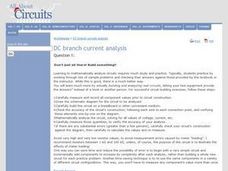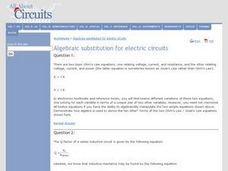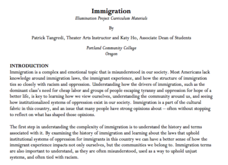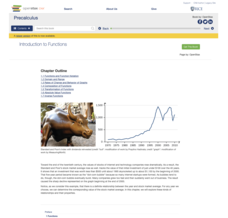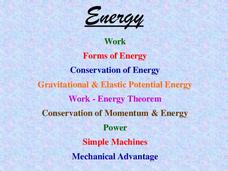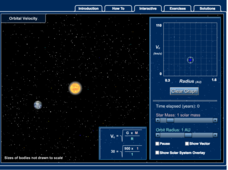Curated OER
DC Branch Current Analysis
Engage your class in physics with this series of questions. The first question is the most hands-on and asks learners to build their own circuit. The rest of the questions are related to current analysis. Class members solve 7 problems...
Curated OER
History of English
Providing both a history of English before England (Sino-Tibetan, Finno-Ugric, Hamido-Semitic, Indo-European) and a history of English in England, this presentation includes charts and many examples of the changes in the English language...
Curated OER
Evaluating Crimes
What is crime? Discriminate between criminal and non-criminal behavior with your scholars by engaging them in potentially heated discussion about various scenarios. A brief definition of the word crime precedes individual analysis of 15...
Curated OER
Quoting, Citing, and Paraphrasing
Beware! (not only the Ides of March). Warn your researchers of the dangers of plagiarism! After defining the term, viewers are introduced to the consequences of and forms of plagiarism, as well as tips on how to avoid plagiarism....
Rice University
College Physics for AP® Courses
Take a look at an organized physics course. The 34-section electronic textbook covers material in AP® Physics 1 and 2. Teachers use the text to supplement lectures and have the class work through the labs. Each section contains...
PBS
Who, Me? Biased?: Understanding Implicit Bias
A 10-page interactive explains different facets of implicit bias, demonstrates how implicit bias works, and how people can counteract its effects. The interactive tools permit users to save their information in "My Work" folders, to take...
Curated OER
Algebraic Substitution for Electric Circuits
For this physics worksheet, students use Ohm's law to solve for voltage, current and resistance. They answer 13 problem solving questions using Ohm's law.
Curated OER
Well, Well, Well
Learners consider a case of potential water contamination by using a process of reasoned discourse about the definition of the problem, the relevant information, and the values behind different solutions. They consider the role of...
Curated OER
Introduction to Mathematical Modeling
In this mathematical modeling worksheet, students answer two essay questions. They describe Newton's Law of Cooling by describing and constructing a model and answering seven essay questions about the process.
Curated OER
Search & Seizure Opinion Poll
Young scholars examine federal and state constitutional law relating to search and seizure. They analyze various scenarios, participate in an opinion poll, and discuss difficulties in balancing individual privacy rights with the need to...
Curated OER
Gas Laws
In this gas worksheet, students calculate molar mass and molecular weight of a given mass of gas at a specific temperature and pressure. Students calculate partial pressure of given gases. This worksheet has 6 word problems.
Curated OER
Family Law: Parent - Child Relationship
Students examine the role courts play in family matters and children's rights. They propose a court-ordered plan to resolve conflicts between parents/guardians and children. Students complete worksheets with various scenarios and discuss...
Curated OER
Criminal Law: Rape
Students explore the different degrees and types of rape as defined in the state of Washington. They role-play as prosecutors, defense attorneys, and judges, with one of each in different groups. The attorneys present their cases and the...
Science Geek
Balancing Chemical Equations
Balancing equations means conserving mass; use the presentation to help learners practice this concept. The resource includes 56 equations for your class to practice balancing. Scholars focus on one reaction type at a time. Groups of...
Curated OER
Business and Advertising
Historical and humorous examples pepper this through presentation, which addresses logical infelicities and humor in business, advertising, and even politics. Though designed for a business and advertising class, this lecture could also...
Curated OER
English Cognates in Various Indo-European Languages
Studying the history, influences, and cognates of the English language, this presentation provides students in linguistics and language classes with several charts of information on cognates from languages around the world. The slideshow...
PHET
Gas Properties
We can't see most gases and we can't see things at the molecular level — but that's about to change! A simulation shows pupils the activity of molecules in a gas. The simulation allows scholars to vary the volume, heat, and...
Curated OER
Immigration Illumination Project Curriculum Materials
Gain an understanding of the complex topic of immigration with a collection of resources. Class members engage in a series of activities designed to give them insight into the factors that influence immigration policies and the effects...
Mr. Waynes clas
Kinematics Objectives
Accelerate young physicists' learning with this collection of problem-solving worksheets. Starting off by teaching students to identify the given information and variables in physics problems, this resource goes on to challenge them...
Rice University
Precalculus
Take a step beyond Algebra 2. Learners use the eBook to learn concepts from the typical Precalculus course. Content starts off with a short review of functions in general and moves on to the basic functions, finishing up with more...
Pulitzer Center
China's Rising Labor Movement
Young historians will explore the complex causes and effects of industrialization in China by perusing the numerous articles included in this webpage. Throughout the resource, there are many writing and discussion prompts to help direct...
Urbana School District
Energy, Work, Simple Machines
The tension of the 236 strings in a grand piano exert a combined force of 20 tons on the cast iron frame. The presentation includes topics such as work, forms of energy, conservation of energy, gravitational and elastic potential energy,...
McGraw Hill
Extra Solar Planets Interactive
Studying what you can't see can be challenging. Discover how scientists use indirect measurements to prove the existence of planets and estimate their sizes. The introduction explains the symbiotic movement of planets and stars during an...
McGraw Hill
Orbital Velocity Interactive
Why does it take Pluto 90,000 days to orbit the sun, but it only takes Mercury 88 days? An interactive lesson helps pupils find a connection between the speed of orbit and distance a planet is from the sun. The simulation allows for...
Other popular searches
- Law and Order Script
- Copyright and Fair Use
- Criminal Law and Procedure
- Police and Law Enforcement
- Business and Law Dictionaries
- Business Law and Ethics
- Lawyers and Courts
- Immigration Law and Policy
- Law and Terrorism
- Newton's Laws and Inertia
- Law and Order
- Lawmen and Outlaws


